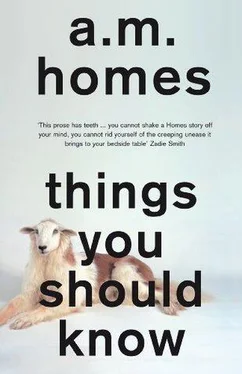“What are you?” Henry asked. “A pervert?”
I didn’t answer.
“Six burgers are drowned,” I said, emphasizing the sinking sensation of the word drowned.
Henry went up the stairs, stood outside the door of his parents’ room, and said in a loud, demanding voice, “When’s Dad coming home?”
“Sometime tomorrow” was the muffled answer.
The fact that she’d answered at all compelled Henry to push the questioning further.
“Are you getting a divorce?” he asked in a loud booming word-by-word voice you’d use to speak in the face of a tidal wave.
From the bottom of the steps, I saw Mrs. open the door in her robe.
“This isn’t about Daddy and me,” she said. “Your father had a problem with the car. He’s trying to straighten things out.”
“There are dishes in the sink — it’s gross.”
Mrs. adjusted her hair, pulled her robe tighter, put one fuzzy pink slipper in front of the other, and marched into the kitchen. She snapped on her rubber gloves, reached deep into the muck, pulled out the macaroni dishes, the frying pan, and, one by one, with the expression of a woman changing diapers, plucked hamburger after hamburger out of the water, held each up in the air for a few seconds to drain, and then dropped the remains into a trash can. She brushed her hair back with her elbow, shook Comet over everything, and went to work under hot water. The steam and Comet mixed to form a delicious noxious cloud-o’-cleanliness that drifted through the house. Whatever had happened hours earlier, the moment that caused dinner to drown, had been a kind of lapse, a seizure of sorts, but now with the green cellulose sponge in hand, everything was all right.
Mrs. Henry turned on the floodlight by the kitchen door, so I could see my way home. A three-foot path of white light cut through the darkness and lit up the grass green and bright.
There was a hill between the houses. A five-foot bump of dirt that changed things. The adults in either house didn’t know each other well; it was too much work. To say hello they had to go around the long way, out the front door, down the flagstone blocks to the sidewalk, up the next driveway, up the flagstone blocks to the three steps, to the front door, and ring the doorbell, ring, ring. Hi, just thought I’d stop over. It didn’t happen. If the land had been flat, if geography had been on their side, everything would have been easier. But the way it was, the Henrys were trapped. On the right edge of their property was a high homemade fence and on the left was this grass-covered tumor-o’-land that may as well have been Mount Baldy.
“Good night,” I said and ran up the mountain toward the house on top of the hill. Mrs. turned the floodlight out behind me.
Using my key I opened the door to the house that would never be my own. The clock in the front hall banged out ten chimes.
My father and Cindy were sitting at the dining-room table, gnawing like rabbits on the remains of a huge salad — my father’s evening grazing, as always, supplemented by a microwaved Lean Eating entrée, parked by his plate like someone’s morning vitamin pill. Every night after their evening meal my father and Cindy disappeared into the “master bedroom suite.” I could hear the click of the door locking. Buried in the “suite” was a custom-crafted tub big enough for six people, a cross-country ski machine, an exercise bike, VCR, twenty-six-inch TV, king-size bed, and even a small fridge. In case of nuclear attack, close bedroom door and wait for the next generation to save you.
What annoyed me the most was the locking of the door. Who did it? Cindy or my father? And how could they think that I, Mr. Privacy himself, was going to come busting in on them? It was infuriating. The other possibility was that they were really doing something in there, something I couldn’t even begin to imagine, although I did imagine.
Alone, I did the dishes, mine and theirs, flipped through the mail, pretended to read the paper, and then, suffocating in boredom and frustration, turned on the eleven o’clock news.
“Early this afternoon, a Philadelphia boy was struck and killed by a car as he was crossing the street on his way home from a program for gifted and talented youth at Herbert Hoover Junior High. Thomas Stanton the Third, who had just turned thirteen earlier this week, was taken to University Hospital where he was pronounced dead. According to police reports, the car was traveling at substantial speed. The driver, forty-three-year-old John Heffilfinger, also of Philadelphia, was arrested at the scene.” A picture of Mr. Henry flashed on the screen — Heffilfinger, no wonder I called them all Henrys — I truly almost didn’t know who it was. I’d never seen him as anything other than Mr. Henry until that moment, when he was plucked out, taken from the Henrys, and put in a whole new category, John “Henry” Heffilfinger, Killer.
When Mr. Henry seemed to be late getting home, I didn’t even think twice about it. Sometimes when fathers are late it’s a good thing. Sometimes they’re buying things, surprises you’d asked for but never thought you’d get — snorkel mask, fins, a better bike.
At thirteen, Thomas Stanton III had enough names and numbers behind his name to sound old enough and scary enough to run a bank. Poor Mr. H., was all I could think. Poor all the Hs. Did Henry even know? After turning out the floodlight behind me, did Mrs. call him into the kitchen for a long sit-down? Or was he alone up in his room, discovering this for himself on his private thirteen-inch Sony?
“Early this afternoon,” the newscaster had said. It hadn’t even happened at night, or at twilight when darkness and light mix together like spit in a kiss. It didn’t happen at some forgivable moment when Mr. Henry could claim the sun at the horizon line blotted out everything, and he and the boy had dipped into darkness. In the middle of a perfectly good afternoon in the end of June, with a breeze that tickled the air like fingertips, he’d become a killer.
News travels fast. “Stay home today,” my father said, ducking his head into my room before he left for the office. “Mr. Heffilfinger has a problem and should be left alone.”
I didn’t say anything. After he and Cindy were gone, I got up, got dressed, ate breakfast, and sat looking out the front window at all the houses just like my father’s, every single one pressed out of the same red brick Play-Doh mold. The ones across the street didn’t come face to face, eye to eye, with ours, they looked into a small half court of their own. I saw those neighbors only in profile, coming and going, carrying bags of groceries up the sidewalk, watering the lawn, pounding a rug, or tending a failing barbecue. They were all Flat Stanleys. Human Colorforms, flat slices of bright, shiny, plastic laid down on a prepainted cardboard world — they could be peeled up and put down again and again, in any order or combination.
With nothing better to do and no options, I started putting wood-grain contact paper in all my dresser drawers. Halfway through, Henry rang the doorbell.
“Can I come in?”
I nodded and stepped back. Henry followed me upstairs to my room.
“I’m just gonna sit here,” he said, patting the edge of my bed.
I didn’t say anything. It was one of those times when clearly no one should talk. I finished cutting, peeling, laying the paper in the drawers, and then put my clean clothing back into the dresser much more slowly, more carefully than a normal person would. When I finished, and Henry still hadn’t talked, I started cleaning, dusting, polishing, rearranging. I was on the verge of remodeling the whole house before he said anything.
“I guess you found out why dinner got wrecked,” he said.
Читать дальше












